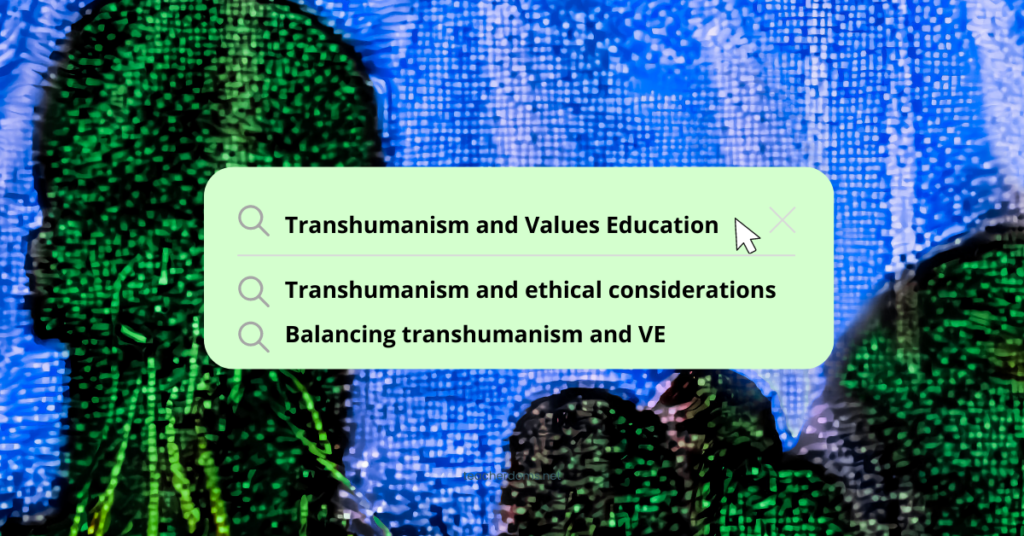
Transhumanism and Values Education in the Philippines: Balancing Ethical Concerns and Technological Progress
Transhumanism, a movement focused on enhancing human abilities through technology, has generated significant ethical discussions globally. In the context of the Philippines, where values education plays a crucial role in shaping the moral compass of its citizens, the implications of transhumanism on values education warrant careful examination.
In this article, I try to delve into the ethical dimensions of transhumanism and its potential impact on values education in the Philippines, highlighting the need for a balanced approach to navigating this complex intersection.
Transhumanism and Ethical Considerations
Transhumanism advocates for the enhancement of human abilities through technological means, such as genetic engineering, artificial intelligence, and human augmentation. While these advancements offer potential benefits, they also raise ethical concerns:
1. Human Dignity and Identity
Enhancements could challenge the essence of being human and the value of human dignity. The Philippines, a predominantly Catholic nation, places a strong emphasis on human dignity, making it vital to evaluate whether certain enhancements could infringe upon this value.
2. Social Equity
Transhumanism has the potential to create a divide between those who can afford enhancements and those who cannot. This raises questions about social justice and equitable access to technology.
3. Unintended Consequences
Rapid technological progress might lead to unforeseen risks and ethical dilemmas. Ensuring that the potential benefits of transhumanism outweigh the risks is essential.
Values Education in the Philippines
Values education is deeply integrated into the Philippines’ educational system, emphasizing moral and ethical development alongside academic learning. “The goal of the Values Education Program (VEP) is to provide and promote values education at all levels of the educational system for the development of the human person committed to the building of a just and humane society and an independent and democratic nation. This is to ensure that the core values of Maka-Diyos, Makatao, Makakalikasan, and Makabansa are instilled among the learners. Core values such as compassion, integrity, and respect for others are integral to shaping responsible citizens.
1. Cultural and Religious Values
The Philippines’ strong religious and cultural heritage has a significant impact on values education. Catholic teachings promote reverence for human life and the sanctity of the individual.
2. Community and Social Responsibility
Values education in the Philippines encourages students to contribute positively to their communities and uphold a sense of social responsibility. This aligns with concerns about social equity posed by transhumanism.
3. Critical Thinking and Ethical Decision-Making
Values education promotes critical thinking skills and ethical decision-making. These skills are crucial for evaluating the potential impacts of transhumanism on society and individuals.
Balancing Transhumanism and Values Education
1. Incorporating Ethical Discussions
The Philippine education system can incorporate discussions on transhumanism within its values education curriculum. Engaging students in conversations about the ethical implications of technological advancements fosters critical thinking and moral reasoning.
2. Promoting Informed Decision-Making
Values education should equip students with the tools to evaluate the potential benefits and risks of transhumanism. This empowers them to make informed decisions that align with their personal values and societal concerns.
3. Collaborative Dialogue
Open dialogue among educators, policymakers, religious leaders, and ethicists can provide a platform for diverse perspectives on transhumanism and its implications for values education. Such discussions can inform policy decisions and curriculum development.
Conclusion
Transhumanism introduces a complex interplay between technological advancements and ethical considerations, which has significant implications for values education in the Philippines. As a nation deeply rooted in religious and cultural values, the Philippines must navigate this intersection with care. Balancing the potential benefits of transhumanism with the core values promoted in values education is crucial. By fostering critical thinking, promoting ethical discussions, and encouraging collaborative dialogue, the Philippines can ensure that the values instilled in its citizens remain resilient in the face of technological progress.
References
- Abat, R. (2018). Philippine Catholic Values in Education: A Historical Overview. Kritike, 12(1), 48-63.
- Bostrom, N. (2014). Transhumanism and the Wisdom of Repugnance. Journal of Human Values, 20(2), 131-142.
- Department of Education (n.d.). Values Education Program (VEP). https://www.deped.gov.ph/wp-content/uploads/2020/06/Values-Education-Program-FAQ.pdf